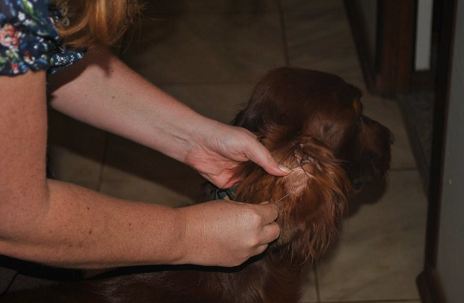INHERITED CANINE BLINDNESS
PROGRESSIVE RETINAL ATROPHY
Bridget & Mark Simpson
Irish Setter DNA Testing co-ordination
e-mail: [email protected]
landline tel:028 - 4233934
Irish Setter DNA Testing co-ordination
e-mail: [email protected]
landline tel:028 - 4233934
Few readers would recognize the terms Deoxyribonucleic Acid, but most will be familiar with the abbreviated term DNA and its forensic applications in proving the identity or guilt of a criminal. With the use of blood and/or saliva samples dog breeders hunt a different DNA criminal – mutant genes that carry adverse genetic canine diseases!
Progressive Retinal Atrophy (PRA), is a blinding condition, which in different forms, affects a wide variety of breeds. Approximately 30 diverse breeds from Yorkshire Terriers to Golden and Labrador Retrievers, can carry the type known as PRA-prcd, Dachshunds in addition to other breeds may carry PRA-cord1 while Irish Setters can carry “early onset” PRA -rcd1 and recently geneticists have discovered a “late onset” type referred to as LOPRA rcd4 in Irish and Gordon Setters.
PRA rcd 1 (Early onset) in IRISH SETTERS
Pups inheriting two genes from their parents will display signs (usually night blindness) from 6 weeks of age and are totally blind by two years old. If only one parent holds the recessive mutant gene approximately 50% of the litter will be “silent” carriers as they will not display any symptoms of the blinding disease, but can carry it to their offspring.
PRA - rcd 1 decimated the Irish Setter breed in UK between the World Wars and using the Test mating system of a blind (PRA affected) dog to a sighted one and clinically examining the eyes of the resulting litter it was possible to determine whether or not the sighted dog was a PRA carrier. However this system of testing was not full proof and despite the breed being restructured, using four PRA clear stud dogs, isolated incidences of the disease continued to surface well into the latter half of the last century.
Irish Setters were one of the first breeds to interest geneticists and in the mid l990’s DNA Tests were perfected and readily available in UK which could implicitly prove whether an Irish Setter held the mutant gene for PRA-rcd 1.
In 2006 South African breeders/owners began DNA testing their dogs using whole blood samples dispatched to Optigen Laboratory (USA). By June 2009 South Africa had its own testing facility when Inqaba Biotec Animal Genetic Testing opened its doors.
Accurate recording of test results have been undertaken backed by submission of Testing Certificates from Laboratories., all of which have now been entered on the Kennel Union of Southern Africa data base.
Many of the imported dogs were cleared by virtue of their ancestry being cleared in their country of export. Others were tested either by Optigen or Inqaba. As at January 2012 the National Register reflects l94 (one hundred and ninety-four) Irish Setters which have either tested clear or are inherited clear by virtue of their ancestry being DNA tested In the next six months an additional 40 pups will be added to the National Register being progeny of PRA rcd 1 clear parentage. These dogs cannot go blind nor carry the genes to the next generation of Irish Setters if bred.
From the beginning of October 2010 the Kennel Union of Southern Africa commenced the issue of an Annexure to the KUSA Certificate of Registration and Certified Pedigree, (commonly called the KUSA Health Screening Certificate) and Irish Setters were the first recipients. This Certificate indicates not only the status of the pup (i.e. inherited clear), but also the status of its parents regarding DNA clearance for CLAD and PRA rcd 1 in addition to the parents Hip scores (HD) Clinical Eye Testing Results and LOPRA rcd-4 where undertaken.
In total 100 (one hundred) Annexures to the KUSA Certificate of Registration and Certified Pedigree (Health Screening Certificates) have been issued nationally to Irish Setters. More will be issued by KUSA to each Irish Setter pup in the litters born in 2012.
It is a credit to REPUTABLE Irish Setter breeders that they have eradicated this condition from their breed.
LOPRA rcd 4 - IRISH SETTERS
This form of Progressive Retinal Atrophy rcd 4 has only recently been identified as a result of research carried out at the Animal Health Trust UK. In South Africa, there is currently no way of knowing the extent to which our breeding lines are affected, if at all. The condition only manifests in mid-life (at or after 6 years of age), when symptoms of blindness become apparent – affected Irish may have been mis-diagnosed in the past or died before the condition manifested. Carriers of a single mutant gene would not display any signs of the disease.
From the beginning of 2013 Irish Setter devotees will commence DNA testing , particularly breeding stock for LOPRA rcd4. Draft Protocols to screen the breed as a whole have already been circulated and supported by owners and breeders. It is hoped that the South African Inqaba Biotec Animal Genetics Laboratory will be able to acquire the technical data from Animal Health Trust UK to effect the DNA testing locally, failing which Test Kits to collect saliva samples will be acquired and couriered to the laboratory in England for Testing.
Thankfully the days of collecting whole blood samples by a Veterinarian are past, Inqaba’s use of Whatman FTA Classic Filter Card Kits only require a prick to the inside of the ear to draw blood for collection on a filter card from which the DNA is extracted.
Progressive Retinal Atrophy (PRA), is a blinding condition, which in different forms, affects a wide variety of breeds. Approximately 30 diverse breeds from Yorkshire Terriers to Golden and Labrador Retrievers, can carry the type known as PRA-prcd, Dachshunds in addition to other breeds may carry PRA-cord1 while Irish Setters can carry “early onset” PRA -rcd1 and recently geneticists have discovered a “late onset” type referred to as LOPRA rcd4 in Irish and Gordon Setters.
PRA rcd 1 (Early onset) in IRISH SETTERS
Pups inheriting two genes from their parents will display signs (usually night blindness) from 6 weeks of age and are totally blind by two years old. If only one parent holds the recessive mutant gene approximately 50% of the litter will be “silent” carriers as they will not display any symptoms of the blinding disease, but can carry it to their offspring.
PRA - rcd 1 decimated the Irish Setter breed in UK between the World Wars and using the Test mating system of a blind (PRA affected) dog to a sighted one and clinically examining the eyes of the resulting litter it was possible to determine whether or not the sighted dog was a PRA carrier. However this system of testing was not full proof and despite the breed being restructured, using four PRA clear stud dogs, isolated incidences of the disease continued to surface well into the latter half of the last century.
Irish Setters were one of the first breeds to interest geneticists and in the mid l990’s DNA Tests were perfected and readily available in UK which could implicitly prove whether an Irish Setter held the mutant gene for PRA-rcd 1.
In 2006 South African breeders/owners began DNA testing their dogs using whole blood samples dispatched to Optigen Laboratory (USA). By June 2009 South Africa had its own testing facility when Inqaba Biotec Animal Genetic Testing opened its doors.
Accurate recording of test results have been undertaken backed by submission of Testing Certificates from Laboratories., all of which have now been entered on the Kennel Union of Southern Africa data base.
Many of the imported dogs were cleared by virtue of their ancestry being cleared in their country of export. Others were tested either by Optigen or Inqaba. As at January 2012 the National Register reflects l94 (one hundred and ninety-four) Irish Setters which have either tested clear or are inherited clear by virtue of their ancestry being DNA tested In the next six months an additional 40 pups will be added to the National Register being progeny of PRA rcd 1 clear parentage. These dogs cannot go blind nor carry the genes to the next generation of Irish Setters if bred.
From the beginning of October 2010 the Kennel Union of Southern Africa commenced the issue of an Annexure to the KUSA Certificate of Registration and Certified Pedigree, (commonly called the KUSA Health Screening Certificate) and Irish Setters were the first recipients. This Certificate indicates not only the status of the pup (i.e. inherited clear), but also the status of its parents regarding DNA clearance for CLAD and PRA rcd 1 in addition to the parents Hip scores (HD) Clinical Eye Testing Results and LOPRA rcd-4 where undertaken.
In total 100 (one hundred) Annexures to the KUSA Certificate of Registration and Certified Pedigree (Health Screening Certificates) have been issued nationally to Irish Setters. More will be issued by KUSA to each Irish Setter pup in the litters born in 2012.
It is a credit to REPUTABLE Irish Setter breeders that they have eradicated this condition from their breed.
LOPRA rcd 4 - IRISH SETTERS
This form of Progressive Retinal Atrophy rcd 4 has only recently been identified as a result of research carried out at the Animal Health Trust UK. In South Africa, there is currently no way of knowing the extent to which our breeding lines are affected, if at all. The condition only manifests in mid-life (at or after 6 years of age), when symptoms of blindness become apparent – affected Irish may have been mis-diagnosed in the past or died before the condition manifested. Carriers of a single mutant gene would not display any signs of the disease.
From the beginning of 2013 Irish Setter devotees will commence DNA testing , particularly breeding stock for LOPRA rcd4. Draft Protocols to screen the breed as a whole have already been circulated and supported by owners and breeders. It is hoped that the South African Inqaba Biotec Animal Genetics Laboratory will be able to acquire the technical data from Animal Health Trust UK to effect the DNA testing locally, failing which Test Kits to collect saliva samples will be acquired and couriered to the laboratory in England for Testing.
Thankfully the days of collecting whole blood samples by a Veterinarian are past, Inqaba’s use of Whatman FTA Classic Filter Card Kits only require a prick to the inside of the ear to draw blood for collection on a filter card from which the DNA is extracted.
This article is copyrighted and remains the property of the author. Individuals are welcome to print or copy same for their own use in furthering their knowledge of dogs. However, no reproductions or alterations/variations are allowed without the express written consent of the author.


